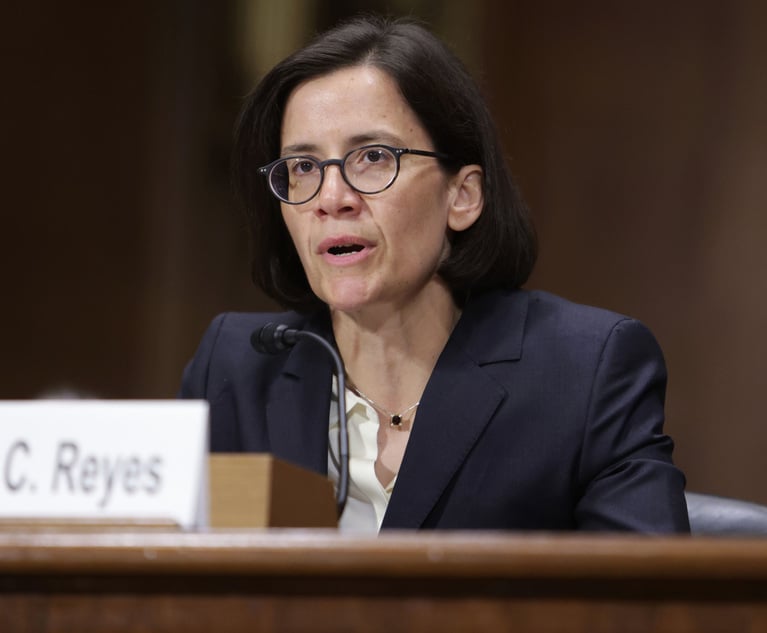Google to Job Seekers Claiming Political Bias: What Does Conservative Mean?
"The term has no objective legal meaning, and instead begs a case-by-case analysis of the political views of every Google applicant over the past four years,” wrote Google's lawyers, who are set to argue a demurrer in Santa Clara Superior Court Friday in a case brought on behalf of engineers claiming bias against political conservatives.
June 05, 2019 at 04:10 PM
4 minute read
The original version of this story was published on The Recorder
 A keyboard with a Google button. (Photo: Shutterstock.com)
A keyboard with a Google button. (Photo: Shutterstock.com)
Google is set to argue Friday that a case claiming the company discriminates against potential hires who hold conservative political views isn't suited for a class action.
Presiding Judge Brian C. Walsh of the Superior Court of Santa Clara County is scheduled to hear arguments Friday on Google's request for demurrer, which claims the facts don't support classwide relief. Google claims the perceived conservative political class of Google job applicants the suit is centered on does not constitute a “well-defined community of interest.” The tech giant, defended by Zach Hutton, a Paul Hastings partner in San Francisco, has asked the court to strike language in the complaint involving political class claims.
“Plaintiffs have not pled an ascertainable class,” the Paul Hastings legal team writes in support of demurrer. “Moreover, the Political Class Claims, on their face, are not suitable to class treatment because they rely on facts unique to each Google applicant, including the applicant's political identity and recorded engagement in political activity, the hiring manager(s)' knowledge of that activity, and the reasons behind the ultimate hiring decision as to that applicant.”
Former Google engineer James Damore brought the class action litigation against Google in January 2018 for allegedly discriminating against him and other conservative white males. Google fired Damore in 2017 for perpetuating gender stereotypes in a 10-page memo distributed to 40,000 co-workers. In the note, Damore accused Google of creating an “ideological echo chamber” that discriminates against people who oppose the dominant liberal ideology and claimed that the tech gender gap could also be caused not just by bias but biological differences, such as women's disposition toward “agreeableness” and “neuroticism.”
Damore and David Gudeman, another plaintiff in the case, withdrew from the lawsuit to pursue claims in individual arbitration late last year. The remaining class is made up of job seekers who say Google's hiring managers discriminated against them for their conservative viewpoints.
The Google applicants' legal team, led by Harmeet K. Dhillon, founding attorney for Dhillon Law Group Inc. in San Francisco, asked the court to overrule the company's demurrer on the basis that it is procedurally deficient. Civil procedure and California Rules of Court, the plaintiffs' team writes in its opposition to the demurrer, “require that each ground of demurrer be stated in a separate paragraph, clearly identifying what claims are at issue—not lumped together in a single, confusingly worded run-on sentence that renders it impossible for Plaintiffs to identify the legal basis for the demurrer, as is the case here.”
Additionally, the plaintiffs' lawyers claim the class was properly defined as “all … job applicants of Google who identified themselves as having conservative viewpoints through their words, actions, and/or conduct, who were discriminated against by Google due to their perceived conservative viewpoints and/or activities” as early as 2014.
Dhillon said she looks forward to getting across this hurdle. “All the major tech companies in Silicon Valley have been under attack for their human resources practices and political discrimination at various levels since this case began,” she said. “There is substantial case law in support for our position.”
Responding to the opposition to demurrer, Google's attorneys claim the job applicants fail to answer how the class members will be identified, forcing the court and the litigants to review millions of hiring records. The filing also claims that Dhillon Law Group has yet to define the parameters of conservative. “The term has no objective legal meaning, and instead begs a case-by-case analysis of the political views of every Google applicant over the past four years,” the company's defense team writes.
Hutton did not respond to request for comment at the time of publication.
This content has been archived. It is available through our partners, LexisNexis® and Bloomberg Law.
To view this content, please continue to their sites.
Not a Lexis Subscriber?
Subscribe Now
Not a Bloomberg Law Subscriber?
Subscribe Now
NOT FOR REPRINT
© 2025 ALM Global, LLC, All Rights Reserved. Request academic re-use from www.copyright.com. All other uses, submit a request to [email protected]. For more information visit Asset & Logo Licensing.
You Might Like
View All

Federal Judge Warns of 'Serious Sanctions' on FDIC Over Document Retention
3 minute read
TikTok Opts Not to Take Section 230 Immunity Fight to U.S. Supreme Court
4 minute read
SEC Sued for Failing to Reveal Records Involving Simpson Thacher Attorney
4 minute readTrending Stories
- 1Judge Grills DOJ on Trump’s Birthright Citizenship Executive Order
- 2Exceptional Growth Becoming the Rule? Demand and Rate Hikes Drove Strong Year for Big Law
- 3Dentons Taps D.C. Capital Markets Attorney for New US Managing Partner
- 4Auto Dealers Ask Court to Pump the Brakes on Scout Motors’ Florida Sales
- 5German Court Orders X to Release Data Amid Election Interference Concerns
Who Got The Work
J. Brugh Lower of Gibbons has entered an appearance for industrial equipment supplier Devco Corporation in a pending trademark infringement lawsuit. The suit, accusing the defendant of selling knock-off Graco products, was filed Dec. 18 in New Jersey District Court by Rivkin Radler on behalf of Graco Inc. and Graco Minnesota. The case, assigned to U.S. District Judge Zahid N. Quraishi, is 3:24-cv-11294, Graco Inc. et al v. Devco Corporation.
Who Got The Work
Rebecca Maller-Stein and Kent A. Yalowitz of Arnold & Porter Kaye Scholer have entered their appearances for Hanaco Venture Capital and its executives, Lior Prosor and David Frankel, in a pending securities lawsuit. The action, filed on Dec. 24 in New York Southern District Court by Zell, Aron & Co. on behalf of Goldeneye Advisors, accuses the defendants of negligently and fraudulently managing the plaintiff's $1 million investment. The case, assigned to U.S. District Judge Vernon S. Broderick, is 1:24-cv-09918, Goldeneye Advisors, LLC v. Hanaco Venture Capital, Ltd. et al.
Who Got The Work
Attorneys from A&O Shearman has stepped in as defense counsel for Toronto-Dominion Bank and other defendants in a pending securities class action. The suit, filed Dec. 11 in New York Southern District Court by Bleichmar Fonti & Auld, accuses the defendants of concealing the bank's 'pervasive' deficiencies in regards to its compliance with the Bank Secrecy Act and the quality of its anti-money laundering controls. The case, assigned to U.S. District Judge Arun Subramanian, is 1:24-cv-09445, Gonzalez v. The Toronto-Dominion Bank et al.
Who Got The Work
Crown Castle International, a Pennsylvania company providing shared communications infrastructure, has turned to Luke D. Wolf of Gordon Rees Scully Mansukhani to fend off a pending breach-of-contract lawsuit. The court action, filed Nov. 25 in Michigan Eastern District Court by Hooper Hathaway PC on behalf of The Town Residences LLC, accuses Crown Castle of failing to transfer approximately $30,000 in utility payments from T-Mobile in breach of a roof-top lease and assignment agreement. The case, assigned to U.S. District Judge Susan K. Declercq, is 2:24-cv-13131, The Town Residences LLC v. T-Mobile US, Inc. et al.
Who Got The Work
Wilfred P. Coronato and Daniel M. Schwartz of McCarter & English have stepped in as defense counsel to Electrolux Home Products Inc. in a pending product liability lawsuit. The court action, filed Nov. 26 in New York Eastern District Court by Poulos Lopiccolo PC and Nagel Rice LLP on behalf of David Stern, alleges that the defendant's refrigerators’ drawers and shelving repeatedly break and fall apart within months after purchase. The case, assigned to U.S. District Judge Joan M. Azrack, is 2:24-cv-08204, Stern v. Electrolux Home Products, Inc.
Featured Firms
Law Offices of Gary Martin Hays & Associates, P.C.
(470) 294-1674
Law Offices of Mark E. Salomone
(857) 444-6468
Smith & Hassler
(713) 739-1250








